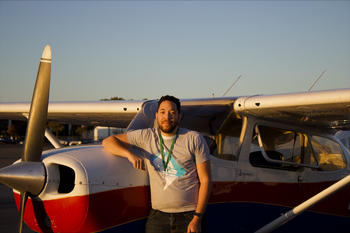In This Story
Matt Conroe is close to attaining a lofty lifelong goal: becoming a licensed pilot. For this recent George Mason University graduate in mechanical engineering, however, something else was pressing this spring, and that wasn’t just getting his ducks in a row to graduate or preparing the final steps for his license. His son Kian was born in April, just nine days before he took part in Commencement.
Conroe graduated with a minor in Aviation Flight Training and Management. “When I was a kid, I was thinking of firefighter, policeman, doctor. But my dad is in the Air Force and has served for 36 years and I thought, ‘I’d like to be a pilot.’”
And will this new dad be grounded by family responsibilities before having the chance to explore the friendly skies? “My wife might have been scared in the beginning,” he said, “but they train you so much that by the time you do your solo flight, you know what to do.”

The minor combines a pilot’s license with aviation management experience, giving students a significant advantage in seeking work with airlines, airports, and in air traffic control.
Business major Hamza Al Tell, who is also just a few steps from obtaining his license, plans to use his experience directly with his family business. Growing up in Jordan, Al Tell’s family ran a skydiving company, and he earned a love of flying at an early age. “I was young, but the captain would let me go up and control the plane a little bit,” he said.
Al Tell loved that he could combine his core degree with his passion. “I was scrolling through minors and saw this one and it was perfect for me. I could do my university studies alongside getting my pilot’s license.”
Lance Sherry, a professor in the Systems Engineering and Operations Research Department, oversees the program. He has more than 30 years of experience in the aviation industry, serving as a flight test engineer, flight control engineer, and system engineer.

"The minor is unique,” he said. “Whether a student is seeking to become an airline or business jet pilot, or to work for an airport, or as an air traffic controller, the program provides a strong foundation of knowledge and skills to be employable anywhere in the industry. The program’s relevance is evident in the career success of our graduates who are shaping a safer, more climate-friendly, socially just air transport system."

The program is ranked 20th in the world, 11th in the United States, and first in the Washington, D.C. region. It began 10 years ago when the university recognized the significant demand for aviation programs in general and flight training specifically.
Sherry said, “There was and remains an airline pilot shortage. This program was designed to enhance the pipeline of licensed pilots to address this.”
“Professor Lance was a great help in all of this," Al Tell said. "When I would see him on the schedule, I would get very excited. Based on his personal experience, he shared with us how the industry works behind the scenes. This was incredible fascinating.”
Conroe added, “I had good professors and I felt like they really cared. They were very professional and knew what they were talking about. You can tell when someone comes in and is really excited.”
“We’ve been nothing but impressed with the caliber and dedication of students who train with us,” said flight instructor Kyle McDaniel, BS Public Administration '10. “As a Mason alum myself, I’m thrilled to share my love of aviation with my alma mater.”
